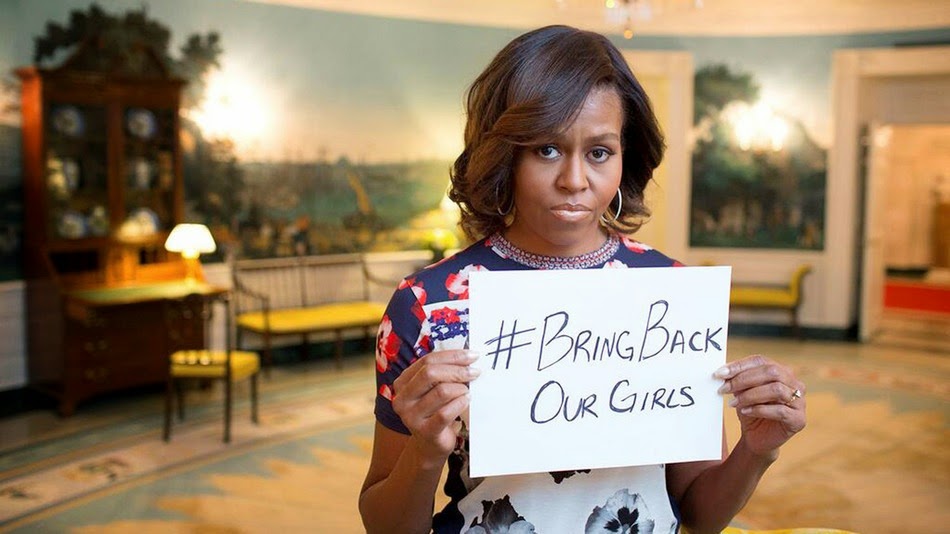Today, I have decided to join everyone that is concerned and I am demanding for the
release of 273 girls abducted by Boko Haram in Nigeria.
“Bring
back our girls” and “I am demanding Boko Haram to bring
back our girls.” I know that these girls are facing a very rough time out there with monsters. I do not want to imagine the worst. But i am praying to the Most High God to protect them.
Just like any other woman, these girls also had dreams, dreams which might be shattered if not saved and brought back home.
Just like any other woman, these girls also had dreams, dreams which might be shattered if not saved and brought back home.
Ugandan women also joined the call for peace and release of the Chibok girls. They demonstrated with placards reading, "Bring back our girls."
The women in northern region said they still have fresh memories of the abduction of 139 girls from St. Mary's College Aboke in 1996 by the Lord Resistance Army (LRA) rebels during the insurgency in Acholi and Lango sub regions.
The Aboke girls’ abduction by the Lord’s Resistance Army
(LRA) left mental scars on students, teachers, parents and the entire nation.
The deputy head mistress of the college, Sister Rachele Fassera, of Italy, pursued the rebels and negotiated the release of 109 of the girls. The Aboke abductions and Fassera's dramatic actions drew international attention, unprecedented at that time, to the insurgency in northern Uganda.
Hope is not lost
Hope is not lost on the missing Chibok schoolgirls, as the
Chief of Defence Staff on Monday assured Nigerians that the search was in
progress.
Air Chief Marshall Alex Badeh told some protesters at the
Defense Headquarters in Abuja, that the military was, however, not using force
to rescue the kidnapped girls.
He said that the military had information on the location of
the girls but would tread softly to get the students out.
“If we go with force, what will happen, they will kill them.
Nobody should come and say the Nigerian military does not know what it is
doing. “We know what we are doing; we can’t go and kill our girls
in the name of trying to get them back”, he said.
Badeh further explained that the fight against the
insurgents could not be likened to a full scale war.
230 Nigerian girls in
Captivity
On the night of 14–15 April 2014, a group of militants
attacked the Government Girls Secondary School in Chibok, Nigeria. They broke
into the school, shooting the guards and killing one soldier.
A large number of
students were taken away in trucks, possibly into the Konduga area of the
Sambisa Forest where Boko Haram was known to have fortified camps.
Houses in Chibok were also burnt down in the incident. The
school had been closed for four weeks prior to the attack due to the
deteriorating security situation, but students from multiple schools had been
called in to take final exams in physics.
There were 530 students from multiple villages registered
for the Senior Secondary Certificate Examination, although it was unclear how
many were in attendance at the time of the attack.
The children were
aged 16 to 18 and were in their final year of school. Initial reports said 85
students were kidnapped in the attack. Over the 19–20 April weekend, the
military released a statement that said more than 100 of 129 kidnapped girls
had been freed. However, the statement was retracted, and on 21 April, parents
said 234 girls were missing.
A number of the
students escaped the kidnappers in two groups. According to the police
approximately 276 children were taken in the attack of which 53 had escaped as
of 2 May. Other reports were that 329 girls were kidnapped, 53 had escaped and
276 were still missing.
Amnesty International later said it believes the Nigerian
military had four hours advanced warning of the kidnapping, but failed to send
reinforcements to protect the school. Nigeria's armed forces have confirmed
that the Nigerian military had four hour advance notice of the attack but that
their over-extended forces were unable to mobilize reinforcements.
Abuse of human rights
The students are being forced into Islam and into marriage
with members of Boko Haram, with a reputed "bride price" of ₦2,000
each ($12.50/£7.50).
Many of the students were taken to the neighbouring
countries of Chad and Cameroon, with sightings reported of the students
crossing borders with the militants, and sightings of the students by villagers
living in the Sambisa Forest.
The forest is considered a refuge for Boko Haram. Local
residents have been able to track the movements of the students with the help
of contacts across north eastern Nigeria.
According to Daily Trust , a man who has two daughters among
the abducted Chibok students has died, days after finding out that his girls
were not in the Boko Haram video released last week.
Mr. Mutai Hona fell ill when he could not see his two
daughters in the video, according to his family.
He never recovered since then, and died on Sunday in Chibok,
Borno State, family member James Yama said in Maiduguri.
A video, which went viral on the social media on Thursday,
that members of dreaded sect, Boko Haram, buried alive and stoned to death one
of the abducted girls of the Government Girls Secondary School, Chibok, Borno
State, has been described as a ruse.
However the Minister of State for Defense, Senator Musiliu
Obanikoro, in a terse response to the video, which gained fast spread among
Nigerians on Blackberry, YouTube and Facebook, said it was shot in Somalia in
2008.
Obanikoro said his position was based on a report by the
British Broadcasting Corporation.













No comments:
Post a Comment